Acer Aspire S7 Ultrabook: Acer’s Best Foot Forward
by Jarred Walton on January 7, 2013 4:30 AM EST- Posted in
- Laptops
- Acer
- Intel
- Ivy Bridge
- Aspire S7
- Ultraportable
- Ultrabook
Display Quality
Now we get to the one area where so many laptops fall short: the display. I’m a bit torn on the overall LCD experience, because on the one hand it’s the best LCD I’ve ever seen in an Acer laptop, but on the other hand there’s still room for improvement. Let’s start with the good news first: Acer is using a 1080p IPS touch screen, which means great viewing angles (which are necessary for any tablet-like experience). Contrast and maximum brightness are also good.
So what’s the problem? The problem is that there’s a reddish cast to the display and the color gamut as well as color accuracy—even after calibration—are not as good as we would like. Apple is still the company to beat for out-of-box color accuracy, and area they’ve greatly improved on with their latest devices.
We’ve been talking about LCD quality in mobile devices for over six years, and finally it looks like companies are heading in the right direction, but we want to get there faster. The ideal would be to have every display calibrated at the factory to provide relatively accurate colors, but barring individual calibration of panels, we’d be happy with the general LCD family targeting a 6500K white point with a sub-3.0 average DeltaE on the Gretag MacBeth color chart. That might sound like we’re asking for professional display quality, but let me point out that: 1) it’s now 2013 and professionals have had the tools to do this for over two decades; 2) we’re looking at a minimum $1400 MSRP laptop, so this isn’t a budget-friendly device to begin with.
Most consumers wouldn’t recognize accurate colors in the first place, and sadly when you’re at the store and a salesperson has two displays next to each other in the bright retail lights, many people will prefer the less accurate but brighter colors that the S7 currently delivers. Even without perfect colors, however, the Acer S7’s AU Optronics B133HAN03.0 v1 panel is pleasing to use. Here are the numbers.
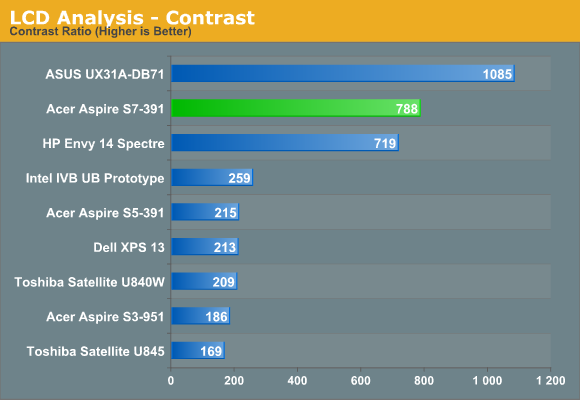
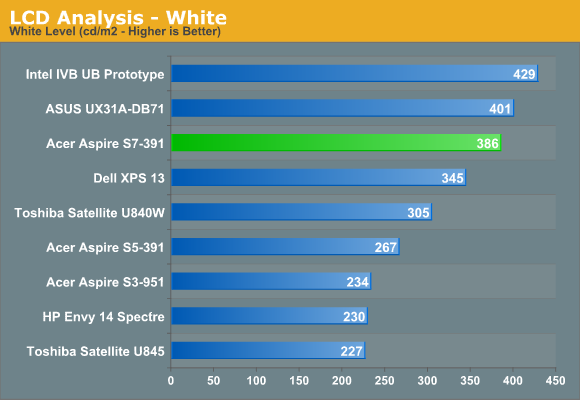
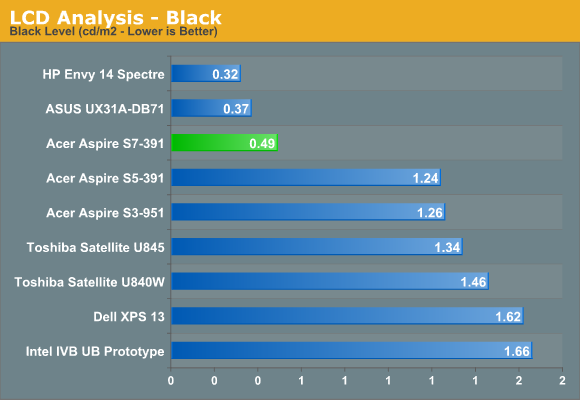
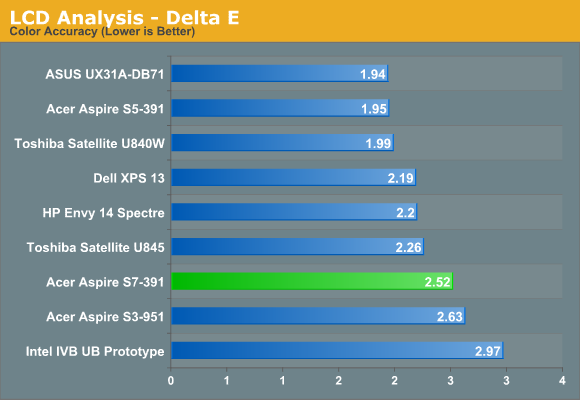
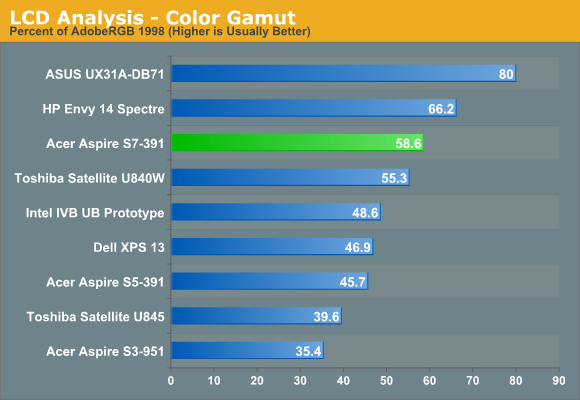
Contrast and brightness are good, though we’ve seen better. As I noted above with the colors being somewhat off before calibration, that carries over post-calibration with an average DeltaE that’s still around 2.5—ideally we’d like to see well under 2.0 for a quality display. The 58.6% color gamut is also less than what we’d like to see, which at a minimum would be the full sRGB color space (around 69%). What’s more, we chose the best calibration result for the above charts; with some of the other targets, the color gamut is a dismal 36%. If you’re okay with the native white point, you get a higher gamut, but if you want to target 6500K or D65, expect to see less than ideal results.










53 Comments
View All Comments
cknobman - Monday, January 7, 2013 - link
Hard to sell at such a high price when your competitors sell comparable (or better) items $500+ cheaper.The Asus UX31A is one of my favorites right now. 1080p touch screen, all aluminum build, core i5, 128gb SSD and
UNDER $1100!!!!!!!!!!!!!!!!!!!!!!!!!
I am toying with getting this right now from best buy: http://www.bestbuy.com/site/Asus+-+Ultrabook+13.3%...
Zanegray - Monday, January 7, 2013 - link
I have a ux31a-ab71 (same as db71 except a smaller ssd) and I LOVE the thing. I don't care for Windows so I put Linux on it and find it my favorite computing device. Under my usage the battery also last for 2 to 3 days at a time. It is snappier than I ever expected and the aluminum case is awesome looking.To summarize... It's just plain sexy.
Paid just over 1000 dollars for it on black Friday too :-)
ironargonaut - Monday, January 7, 2013 - link
Is an IPS screen that fantastic on a 14in laptop that I should pay $700 more?kyuu - Monday, January 7, 2013 - link
You're not paying $700 for the IPS screen.drjacko - Monday, January 7, 2013 - link
Original: "I can’t understate how impressively thin this thing is"But the article is very good as a review as well as a commentary of the path taken by Acer.
Would you have considered a side by side shots against MB counterparts and previous version of Acer's ultrabook?
rarson - Monday, January 7, 2013 - link
For the life of me, I can't understand why someone would want one of these over a normal laptop. Am I the only person who cannot stand ultra-thin (and ultra-flimsy) notebooks? I feel like I'm going to break the thing just by opening it up. A crappy keyboard, touchscreen, and absurd pricing makes this about as useful as a Surface tablet. Which is to say, pretty f#&@ing useless.Even if you do like the ultra-thin junk, I still don't see why you'd want to pay such a premium for a touchscreen on a laptop, although I suppose when your keyboard is that crappy, you'll be yearning for some other kind of input device.
If I want a consumption device, I'll buy a Nexus tablet or similar. If I want a computing device, then I'll buy a regular laptop. For the price of one of these, I could buy one of each and STILL save a chunk of change.
kyuu - Monday, January 7, 2013 - link
1) These devices are not "ultra-flimsy", despite being very thin. If you "feel" like you're going to break it, that's your problem. You remind me of my grandmother arguing that you have to drive a gigantic Oldmobile or an SUV to be safe because smaller cars don't "seem" like they could be as safe.2) If you don't see the value proposition in a device like this, then obviously it's not for you. I don't see the value proposition in buying a Mercedes, for example, but that doesn't mean they shouldn't be built.
Tech-Curious - Monday, January 7, 2013 - link
To be fair, your grandmother is right: all else being equal, a lighter car is less safe, possibly a lot less safe depending on the particulars.AnnoyedGrunt - Tuesday, January 8, 2013 - link
Except that all else isn't equal, is it? Cars today are much, much safer than they have ever been, and even a small, modern car would be much safer than Granny's Oldsmobile.As far as the ultra-thin laptops go, I'm not a huge fan, but I can understand how someone who travels would really like the smaller, more portable size. My wife has a Macbook Pro 15 (non-retina), and I have a Dell Precision M4600 for work, and those are reasonable sizes for me.
This Acer is interesting, very similar in cost to a Macbook Air, but with better specs in most areas. However, one thing the Macs have done MUCH better than Windows laptops is make the touchpad useful. I don't know if it's a combination of OSX and hardware, or better drivers, or what, but it is so much easier to use the touchpad on my wife's Macbook than the one on my Dell (and any other Windows laptop I've used). I don't feel the need to use a mouse on the Mac, but on the Dell I always feel handcuffed without it (and this is for things like MS Office, web browsing, etc.).
I would have liked to see some Macbook Air battery life results and performance results, since I feel that is one of the biggest competitors for the Acer.
Ovreall I'm happy to see some in the PC industry making products that move in the direction of quality rather than price. Once you get to the point where the price isn't as much of an issue (especially for something you'll be using for 4-5 years) the enjoyment of using something that has high-quality interface points (monitor, keyboard, etc.) quickly overcomes the cost difference. Still would prefer something a bit thicker with a better keyboard and more battery life, though.
-AG
Tech-Curious - Tuesday, January 8, 2013 - link
As to your first comment, I don't know that that's universally true. Sure, in general, a modern car will have safety advantages an older car doesn't -- but size does matter: Is a 2013 Smart Car as safe as granny's Oldsmobile? Not a chance. All the airbags in the world can't compensate for the loss of mass.Even today, there are significant differences in mass within the same class of car. So if you have a choice between otherwise analogous vehicles, choosing the heavier one is (generally) safer.
The heavier option is probably also less fuel efficient, though, so like everything else, it's a trade-off.
As to the rest, I have to agree.